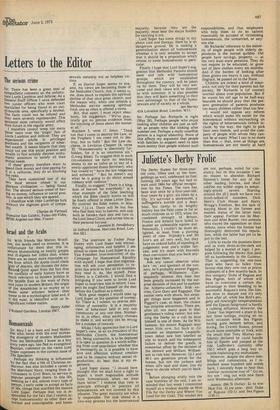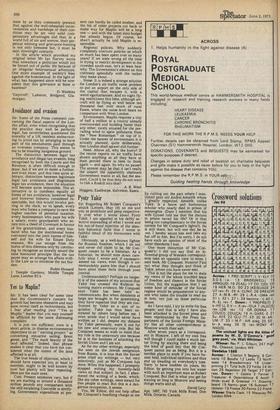Juliette's Derby Frolic
The Derby Stakes for three-yearold colts, fillies and, at the time, geldings as well, celebrated its first running 193 years ago but had to wait until 1804 for official recognition by the Times. The race has been won once by a four-year-old, four times by a grey, six times by a filly. It's survived a snowstorm, a suffragette's suicide and a deadbeat, but rarely in its lengthy history has the field come in for so much criticism as in 1973, when the combined strength of Britain, France and Ireland have failed to muster an unbeatable equine star. Personally, I couldn't be more delighted, at least from a punting point of view. Nijinsky's and Sir Ivor's are all very well, but they have an unkind habit of standing in judgement over one's wilder fancies, and it's more with bravado than conviction that you back anying to beat them. Ask any casual observer what he's ' on ' and ignorant of the runners, he'll probably answer Piggott, of perhaps, Williamson. Consequently interest this time has been greatly increased by the surprise decision of this pair to partner the hitherto-unfancied, Irish entries, Cavo Doro and Ragapan. The nation reels with shock, but stranger things have happened and in Piggott's case, at least, the choice has irristible attractions. There are, after all, not many gaps in that gentleman's riding career, but winning the Derby on a colt he bred himself is one of them. As for Williamson, his mount Ragapan may mean little row, but back in zhc autumn an impressive Leopardstown debut saw him labelled as one to watch and his subsequent failure to deliver the goods, is somewhat offset by the decision of the shrewd and brilliant Williamson to ride him. However, 12-1 and 40-1 are generous prices for the horses, but not the jockeys and when all's said and done, you do have to decide which you're backing.
Before plunging wildly into the case histories of the rest, I am reminded that last week I committed myself to a modest double on Mon Fils for the Derby and Where You Lead for the Oaks. The weaker sex are not, perhaps, noted for constancy, but on this occasion I see no reason to abandon Richard Hannon's horse for any of the other leading fancies, and shall confine my wilder urges to tempt ingly-priced savers. Starting around the 25-1 mark we have two much-talked-of outsiders, Dick Hem's Club House and Harry Wragg's Freefoot. But the lack of staying blood in the former and maiden status of the latter limit their appeal. Further out lie Morston and After Burner, two animals who slayed the opposition on their debuts, since when the former has thoroughly destroyed his reputation, while the latter has yet to be put to the test.
Little to excite the passions there and as even shots-in-the-dark are helped by a morsel of logic, I propose following the theory that paid off so handsomely in the Guineas. That is, supporting the one-time stars who have so fallen from favour that they now rest at prices undreamt of a few months back. In this category: Duke of Ragusa and Sea Pigeon, both of whom will have to overcome a certain disadvantage in their breeding to be successful. Ragusa's sons, like him, are slow to mature and it's only June after all, while Sea Bird's progeny are downright temperamental and the Epsom fairground is hardly a calming influence. However, the ' Duke' has improved a place in his last three outings, staying on on each occasion while Sea Pigeon having gone berserk before, and during, the Craven Stakes, proved much more amenable at York, with the result that Tony Murray confidently declared he could handle him at Epsom and jumped at the ride. Ladbroke's currently offer 150-1 which goes a long way towards explaining my enthusiasm.
However, despite the above ramblings and ruminations, as I remarked some hundred odd words back, I sincerely hope to hear that familiar racecourse roar of" Go on, my son " ring out with new force next Wednesday afternoon.
Assets: £98.78 Outlay: £2 to win Mon Fils CI ew antepost Duke of Ragusa (33-1) and Sea Pigeon (150-1). done by as they commonly pretend; that against the well-rehearsed inconveniences and hardships of their condition may be set very solid compensatory advantages and that, in a world full of sin and sorrow, their perpetual whining and grievance-hunting is not only tiresome but, it must be said, downright unmanly.
In the article which provoked my original letter Mr Ian Harvey wrote that nowadays a politician would not be forced out of public life because of an irregular heterosexual adventure. One more example of society's bias against the homosexual. In the light of what has happened since will he now admit that this grievance at least is baseless?
D. Watkins 'Gaycroft', Laleston, Bridgend, Glamorgan.



































 Previous page
Previous page